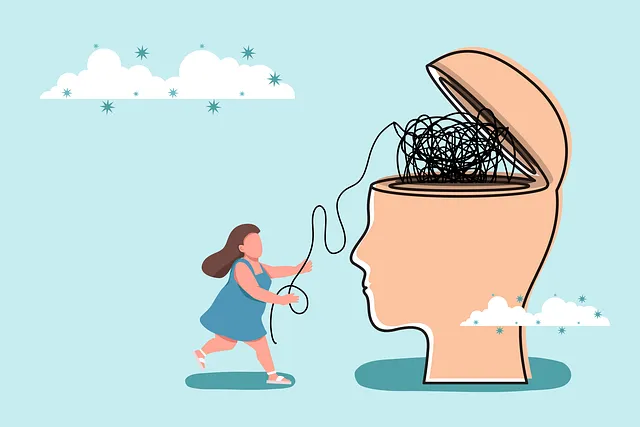Mental wellness group facilitation, as practiced by Kaiser Permanente in Westminster, is a specialized therapy that empowers individuals dealing with mental health challenges through shared experiences and coping strategies. This collaborative approach emphasizes cultural competency to create safe, supportive environments where participants from diverse backgrounds feel heard. By combining active listening, cultural sensitivity, and emotional intelligence, facilitators foster open dialogue, build resilience, and enhance self-esteem. Kaiser Permanente measures success not just through satisfaction surveys but comprehensive KPIs tracking reduced anxiety, improved coping skills, and enhanced social support, continuously improving their evidence-based Mental Health Education Programs.
Mental wellness group facilitation is a powerful tool for fostering community and healing. This article explores effective techniques used by professionals, drawing on best practices from organizations like Kaiser Permanente, specifically their successful implementation at Westminster. We delve into creating supportive spaces, key strategies for engaging participants, and measuring the impact of these groups on mental health outcomes. Understanding these methods can empower individuals and communities to enhance overall wellness.
- Understanding Mental Wellness Group Facilitation
- Kaiser Permanente's Approach to Group Therapy
- Key Techniques for Effective Group Sessions
- Creating a Safe and Supportive Environment
- Measuring Success and Continuous Improvement at Westminster
Understanding Mental Wellness Group Facilitation

Mental wellness group facilitation is a specialized skill that plays a pivotal role in supporting individuals navigating mental health challenges. It involves creating a safe and supportive environment where participants can share experiences, gain insights, and learn coping strategies from one another. This collaborative approach to therapy has proven effective for various mental health concerns, including anxiety, depression, and stress management, as highlighted by research conducted at Kaiser Permanente mental health Westminster.
Effective group facilitation requires a nuanced understanding of diverse backgrounds and perspectives within the group, especially in today’s multicultural society. Healthcare providers who facilitate these groups must possess cultural competency skills to address potential barriers and ensure every participant feels heard. This involves tailoring discussions, activities, and resources to meet the unique needs of the group, fostering an inclusive Mental Wellness Podcast Series Production that empowers individuals on their journey towards mental wellness.
Kaiser Permanente's Approach to Group Therapy

Kaiser Permanente, a renowned healthcare provider, offers a comprehensive approach to mental wellness that includes group therapy as a valuable tool. Their programs are designed to support individuals in navigating various challenges related to mental health and well-being. In the context of Kaiser Permanente mental health Westminster, their group facilitation techniques focus on creating a safe and supportive environment where participants can connect, share experiences, and learn from one another.
The organization emphasizes evidence-based practices, incorporating strategies for stress reduction methods, anxiety relief, and self-esteem improvement. Through structured group sessions, facilitators guide participants in exploring coping mechanisms, building resilience, and fostering social connections. This collaborative approach not only enhances individual mental health but also contributes to a stronger support network within the community.
Key Techniques for Effective Group Sessions

Effective mental wellness group facilitation involves a blend of key techniques tailored to create a safe and supportive environment. One powerful approach is active listening, where facilitators pay close attention to each participant’s unique experiences, fostering open dialogue and empathy. This technique, encouraged by organizations like Kaiser Permanente mental health Westminster, builds trust and encourages vulnerability, essential for meaningful group interactions.
Additionally, incorporating cultural sensitivity in mental healthcare practice is vital. Understanding and respecting diverse cultural backgrounds and beliefs can significantly enhance group dynamics. Facilitators should be adept at navigating sensitive topics, ensuring every individual feels seen and heard regardless of their background. This aspect, coupled with strong emotional intelligence, enables professionals to manage emotions effectively within the group setting, promoting a positive atmosphere conducive to healing and growth.
Creating a Safe and Supportive Environment

Creating a safe and supportive environment is a cornerstone of effective mental wellness group facilitation, particularly when offering services like those provided by Kaiser Permanente mental health Westminster. This involves fostering an atmosphere where participants feel comfortable expressing their thoughts and emotions without fear of judgment or repercussions. Facilitators can achieve this through open-ended questions that encourage dialogue, active listening to ensure every voice is heard, and using inclusive language that respects diverse backgrounds and experiences.
Promoting self-care routine development for better mental health is a key aspect of this process. Encouraging members to share their coping mechanisms and strategies allows them to learn from one another, enhancing the group’s collective resilience. Additionally, organizing stress management workshops and conflict resolution techniques sessions within the group setting can equip participants with valuable tools to navigate challenging situations, ultimately strengthening the support system within the group.
Measuring Success and Continuous Improvement at Westminster

At Westminster, measuring success in mental wellness group facilitation goes beyond mere satisfaction surveys. The Kaiser Permanente mental health Westminster initiative incorporates a multifaceted approach to assess the impact and effectiveness of their programs. This involves tracking key performance indicators (KPIs) related to participant well-being, such as reduced symptoms of anxiety and depression, improved coping skills, and increased social support networks. Additionally, they conduct regular follow-up assessments to gauge long-term benefits and identify areas for improvement.
Continuous improvement is a cornerstone of their strategy. By analyzing feedback from participants, facilitators, and healthcare professionals, Westminster designs evidence-based Mental Health Education Programs that address emerging needs. They also implement Stigma Reduction Efforts to foster an inclusive environment, ensuring individuals feel comfortable discussing mental health challenges. Furthermore, burnout prevention strategies for healthcare providers are integrated into the program design, promoting sustainable care and enhancing overall mental wellness within the healthcare system.
Mental wellness group facilitation plays a pivotal role in improving the lives of individuals, as evidenced by Kaiser Permanente’s successful approach and the transformative experiences seen at Westminster. By creating safe spaces and employing techniques that foster open communication, these programs offer sustainable support. As we navigate the landscape of mental health care, adopting evidence-based strategies, such as those showcased here, can revolutionize how we address emotional well-being in communities like Kaiser Permanente mental health Westminster.






